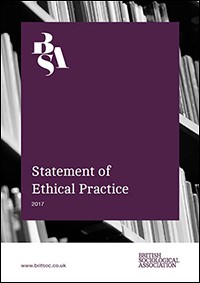 By Huw Davies, University of Oxford and Professor Susan Halford, University of Southampton
By Huw Davies, University of Oxford and Professor Susan Halford, University of Southampton
With its 1.8 Facebook followers Britain First has the biggest political presence on any social media operating in the UK. The founder of Breitbart is in the White House. The government is staking our future on digital capitalism. Sociology can no longer underestimate how much the digital is reshaping society. The digital turn also offers us an opportunity to redefine to the relationship between the micro and the macro. Algorithms, searches, clicks, posts, tweets, likes etc. are micro events that have social consequences at scale of what Bourdieu calls 'structuring structures' such as class. When Sociology synthesises digital methods capable of capturing these micro events with its sophisticated theories of society it is uniquely equipped to study the architecture of these socio-technical structures. However, if we are to make the most of these opportunities we must also consider how to approach the ethical challenges that arise with these new forms of digital data.
In this regard, we find ourselves in the midst of a perfect storm. On the one hand, the progressive bureaucratisation and professionalization of research governance over the past 50 years has led to strong principles and practices about how to ensure the ethical appropriacy of research - informed consent, guaranteed anonymity, the right to withdraw for example – underpinned by requirement for prospective ethical approval and the assumption that, as researchers, we are able to control and protect our data. On the other hand, over the same time-frame, we have simultaneously seen the development of new technologies – the internet and the Web and all that has come with these – that produce data that from the very beginning contravene these principles: personal data are already in the public realm, owned and managed by commercial organizations with their own imperatives and nigh on impossible to anonymise with any future proofing as data mining and data linkage become increasingly sophisticated
So what to do? In a world where commerce, government and industry are making the most of these data can Sociologists afford to simply disengage? This would marginalise us from some of the (potentially) most powerful data resources for our research and cede the field to those driven by other interests (profit, surveillance, governance, for instance). Alternatively, we can think constructively and prospectively about how best to develop a new framework for ethical research with these new forms of digital data.
The BSA has taken the step of adding a 'digital research' annexe to its newly revised ethical guidelines. In developing this, it was clear that it had to be a 'living document' that could learn from experience and best practice and respond flexibly as the nature of digital data continues to evolve, along with the methods available to interrogate them. Accordingly, our annexe does not present a hard and fast set of rules, but draws together resources intended to support individuals – as they develop research protocols – and the wider sociological community – as we build the field of research with digital data.
All sociologists can access the BSA Statement of Ethical Practice and the Ethics Guidelines and Collated Resources for Digital Research on the BSA website. The Association used a consultative process to update it and are very happy to launch our newest guidance on ethical research practices for sociologists. The revised ethics guidelines provide an update that takes into account key changes that have affected sociologists' work roles and research engagement. We have expanded the resources to better respond to the needs and queries facing researchers in the current environment.
The guidelines and resources for digital research will be further supplemented with a number of case studies, which will be published over the next few months. If you are interested in presenting a case study to further the discussion of sociology and research ethics or would like to comment on the guidelines, we invite you to get in touch with us at publications@britsoc.org.uk
We thank all those who gave their time to this process and hope that these guidelines will provide a useful resource for sociologists in the current work and research context. A working group led by BSA Publications Director Rosaline Barbour undertook the updating of the BSA Statement of Ethical Practice. Their efforts included updating the existing statement (drafted in 2002 and published in 2004) and the inclusion of a new annexe addressing digital research ethics. Our thanks to this working group: Rosaline Barbour (Trustee), Daniel Conway, Huw Davies, Robert Dingwall, Susan Halford, Christine Hine, Christina Hotz, Wendy Martin, Gabriel Newfield and and Lisa Suguira. John Oates also contributed in an advisory capacity. We also thank the authors, anonymous and named, who have contributed case studies on the various aspects of research ethics for sociologists.
